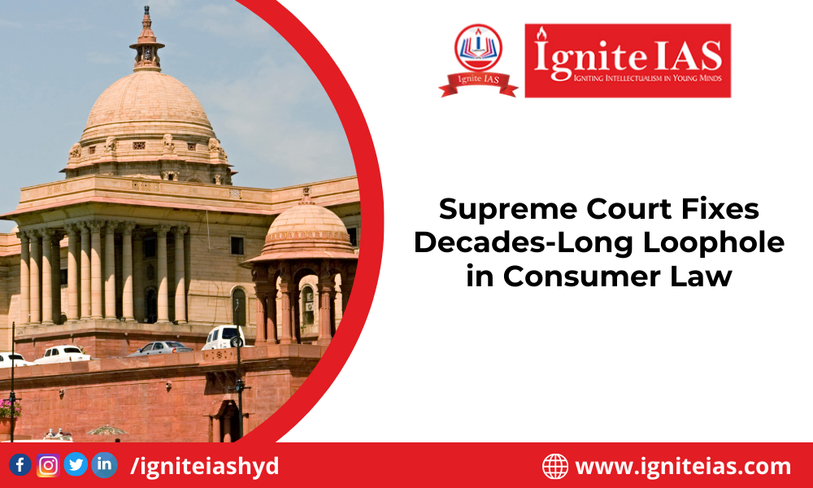Imagine fighting for your property rights and winning—only to be left with a paper judgment, useless in real life. That was the plight of many consumers until the Supreme Court stepped in. Recently, the top court ruled that consumer forums can finally enforce all their orders, not just temporary ones, treating them like civil court decrees. Let’s unpack what this means for civil liberties and how staying informed—especially with the Best UPSC Coaching in Hyderabad—keeps you ahead of the curve.
Introduction
If you think consumer law is just for the marketplace and lawyers, think again. For UPSC aspirants, this ruling is a perfect case study on constitutional interpretation, legislative drafting flaws, and judicial remedies. And when your coaching keeps you updated with such real-time developments—well, that’s a game-changer.
Here’s what’s coming up:
| Sr | Headings |
|---|---|
| 1 | Why UPSC Aspirants Should Care |
| 2 | What Did the Supreme Court Rule? |
| 3 | The 2002 Amendment: A Legislative Misstep |
| 4 | Section 25(1) Read with “Any Order” |
| 5 | Real-Life Story: The Palm Groves Case |
| 6 | Behind the Data: Execution Pendency Stats |
| 7 | Tools Used: Purposive Interpretation at Work |
| 8 | Broader Impact: Justice in Reality, Not Just on Paper |
| 9 | Analogy Break: Consumer Law Like a Leaky Bucket |
| 10 | Civics and Ethics Angle for UPSC Answers |
| 11 | How Best UPSC Coaching in Hyderabad Elevates Your Preparation |
| 12 | Key Takeaways for Your Mains Strategy |
| 13 | Conclusion |
| 14 | FAQs |
1. Why UPSC Aspirants Should Care
You may wonder, “Consumer law? Really?” Yes—and here’s why it matters:
- UPSC Mains often demand quality analysis of how legislative flaws are corrected by judicial action.
- This case covers constitutional law, legislative drafting errors, access to justice, and administrative data.
- It’s a rich, practicing example for topics like fundamental rights, legal awareness, and good governance.
2. What Did the Supreme Court Rule?
On August 22, 2025, in a landmark judgment, the Supreme Court ruled that consumer forums can enforce all their orders—final or interim—as if they were civil court decrees. This move effectively patched an 18-year legislative loophole that prevented enforcement of final consumer orders from 2003 to 2020 Live Law24law.
3. The 2002 Amendment: A Legislative Misstep
Originally, Section 25(1) of the Consumer Protection Act, 1986 allowed enforcement of “every order” as a decree. But in 2002, lawmakers replaced that phrase with “interim order,” leaving final orders unenforceable—an oversight with real consequences Hindustan TimesLawyer E News.
4. Section 25(1) Read with “Any Order”
The Supreme Court corrected this drafting error through purposive interpretation—reading “interim order” as “any order” and applying Order XXI of the Civil Procedure Code for enforcement 24lawLawyer E News. This restored pre-2002 intent and aligns with the 2019 Consumer Protection Act.
5. Real-Life Story: The Palm Groves Case
The case involved flat purchasers of Pune’s Palm Groves Cooperative Housing Society. A 2007 consumer forum order directed the builder to execute a conveyance deed—not just compensation. But because of the 2002 amendment, this wasn’t enforceable until the Supreme Court intervened Court Book24law.
6. Behind the Data: Execution Pendency Stats
Attorney General R. Venkataramani highlighted the scale of the impact: execution cases jumped from about 1,470 cases (1992–2002) to 42,118 (2003–2019) and further to 56,578 (2020–2024) at district forums. State and national commissions also had thousands pending. The Court urged the NCDRC to expedite disposal and appointed amicus curiae to strengthen enforcement mechanisms Hindustan TimesLawChakra.
7. Tools Used: Purposive Interpretation at Work
To correct the law without rewriting it legislatively, the Supreme Court used purposive interpretation—understanding what the statute intended to achieve—thus upholding the spirit of consumer justice over literal wording Lawyer E NewsLive Law.
8. Broader Impact: Justice in Reality, Not Just on Paper
As the bench rightly said, “Consumers should feel justice in reality, not just on paper.” This reinforces a foundational UPSC principle: laws must deliver real-life outcomes, not just judgments. And that’s a narrative you can build on in exam answers Hindustan TimesLawChakra.
9. Analogy Break: Consumer Law Like a Leaky Bucket
Think of consumer law as a bucket meant to collect justice. But a hidden hole (the 2002 amendment) meant complaints and verdicts leaked away—consumers were left empty-handed. The Supreme Court just patched that leak, restoring the bucket’s function: delivering actual, enforceable relief.
10. Civics and Ethics Angle for UPSC Answers
Use this case to showcase how:
- Judicial review protects statutory intent.
- Beneficial legislation demands creative interpretation.
- Systems must ensure access to justice, not just declaratory judgments.
- This aligns with ethics topics like procedural fairness and citizen-centric governance.
11. How Best UPSC Coaching in Hyderabad Elevates Your Preparation
Here’s why mentioning the Best UPSC Coaching in Hyderabad matters:
- These programs integrate current rulings into analysis—not just in notes, but in discussions.
- They help you craft answers rich with analogies, data, and case law—all in simple conversational tone.
- When mock tests and pencil-pencil sessions reflect real-time changes like this, your prep gets stronger.
12. Key Takeaways for Your Mains Strategy
- Always monitor legislative loopholes and judicial corrections.
- Use data to strengthen your analytical writing (e.g., pendency statistics).
- Develop analogies to humanize legal concepts.
- Choose coaching that emphasizes live examples and answer crafting.
Conclusion
This Supreme Court ruling is more than a legal fix—it’s a reminder of how lived justice works, beyond judgments. For you as a UPSC aspirant, it’s a template: know your law, explain its evolution, and deliver it in compelling, exam-friendly prose. And having the Best UPSC Coaching in Hyderabad guiding you makes it a smoother, smarter journey.
FAQs
1. Why couldn’t consumer forums enforce final orders between 2003–2020?
Because the 2002 amendment to Section 25(1) altered the wording from “every order” to “interim order,” leaving a loophole where only temporary orders could be enforced—not final ones Lawyer E NewsLive Law.
2. How did the Supreme Court correct this oversight?
Through purposive interpretation, the Court read “interim order” as “any order” and applied civil execution provisions (Order XXI CPC), thereby restoring enforcement power to consumer forums 24lawLawyer E News.
3. What impact does this judgment have on pending consumer cases?
Thousands of execution petitions from 2003–2024 are now enforceable. The Court also urged NCDRC to expedite disposal and appointed assistance to strengthen enforcement Hindustan TimesLawChakra.
4. How does this ruling help UPSC aspirants in exam answers?
It provides a real-world example of legislative correction, judicial activism, and citizen justice—perfect for explaining how rights and laws evolve, especially under topics like governance, ethics, and constitutional law.
5. Why is choosing the Best UPSC Coaching in Hyderabad beneficial in this context?
Such coaching ensures you don’t just memorize facts—you understand the why, how, and application of current developments, and learn to present them in compelling, examiner-friendly answers.




